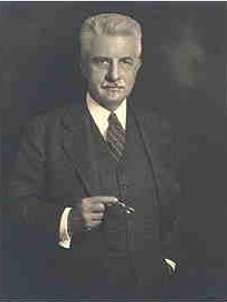Arthur Oncken Lovejoy facts for kids
Quick facts for kids
Arthur Oncken Lovejoy
|
|
|---|---|
 |
|
| Born | October 10, 1873 |
| Died | December 30, 1962 (aged 89) |
| Education |
|
| Academic advisors | William James Josiah Royce |
|
Notable ideas
|
History of ideas |
|
Influenced
|
|
Arthur Oncken Lovejoy (born October 10, 1873 – died December 30, 1962) was an American philosopher and historian. He is famous for starting a field of study called the history of ideas. His most important book, The Great Chain of Being (1936), is about a big idea known as the Great chain of being. This book is seen as one of the most important works in the history of ideas in the United States for many years.
Contents
Biography
Lovejoy was born in Berlin, Germany. His father was doing medical research there. When Arthur was 18 months old, his mother died. After this, his father stopped being a doctor and became a clergyman.
Arthur Lovejoy studied philosophy. He first went to the University of California at Berkeley. Then he studied at Harvard under famous thinkers like William James and Josiah Royce. He did not earn a Ph.D.
In 1901, he quit his first job at Stanford University. He did this to protest when a colleague was fired. The president of Harvard then decided not to hire Lovejoy. Over the next ten years, he taught at several universities. These included Washington University, Columbia University, and the University of Missouri. He never got married.
From 1910 to 1938, Lovejoy was a philosophy professor at Johns Hopkins University. There, he started a group called the History of Ideas Club. Many important historians and writers met there. In 1940, he helped start the Journal of the History of Ideas.
Lovejoy believed that the history of ideas should focus on "unit ideas." These are single, simple concepts. For example, words like 'pragmatism' or 'idealism' might seem like one idea. But Lovejoy thought they were made up of many smaller, separate ideas. He believed historians should find these basic "unit ideas." Then they could show how these ideas combined and changed over time.
Lovejoy also disagreed with Albert Einstein's theory of relativity. In 1930, he wrote a paper that criticized Einstein's idea of simultaneity.
Lovejoy was also active in public life. He helped create the American Association of University Professors. He also helped start the Maryland chapter of the American Civil Liberties Union. He believed in civil liberties, which are basic rights and freedoms. However, he felt that some things could threaten a free system. For example, during the McCarthy Era in 1952, he stated his view. He thought that being a member of the Communist Party could go against "freedom of inquiry and teaching." He believed this could be a reason to dismiss someone from an academic job. He also wrote many articles for newspapers in Baltimore. He passed away in Baltimore on December 30, 1962.
Scholarship
Lovejoy is well-known for his important book, The Great Chain of Being: A Study of the History of an Idea (1936). This book explores the idea of the "Great Chain of Being." This was an old idea that everything in the universe was connected in a long, unbroken chain, from the simplest things to the most complex.
A historian named William F. Bynum looked back at Lovejoy's book after 40 years. He said it was a "familiar feature of the intellectual landscape." This means the book was very influential and continued to be popular. Bynum agreed with Lovejoy that the idea of the Great Chain of Being began to change a lot around the end of the 1700s. This was during the Enlightenment.
Books
- Primitivism and Related Ideas in Antiquity, (1935). (with George Boas). Johns Hopkins U. Press. 1997 edition: ISBN: 0-8018-5611-6
- The Great Chain of Being: A Study of the History of an Idea (1936). Harvard University Press. Reprinted by Harper & Row, ISBN: 0-674-36150-4, 2005 paperback: ISBN: 0-674-36153-9.
- Essays in the History of Ideas (1948). Johns Hopkins U. Press.
- The Reason, the Understanding, and Time (1961). Johns Hopkins U. Press. ISBN: 0-8018-0393-4
- Reflections on Human Nature (1961). Johns Hopkins U. Press. ISBN: 0-8018-0395-0
- The Thirteen Pragmatisms and Other Essays (1963). Johns Hopkins U. Press. ISBN: 0-8018-0396-9
Articles
- "Professional Ethics and Social Progress," The North American Review, March 1924.
- "Plans for the Future," Free World, November 1943.
See also
 In Spanish: Arthur O. Lovejoy para niños
In Spanish: Arthur O. Lovejoy para niños
 | Sharif Bey |
 | Hale Woodruff |
 | Richmond Barthé |
 | Purvis Young |

